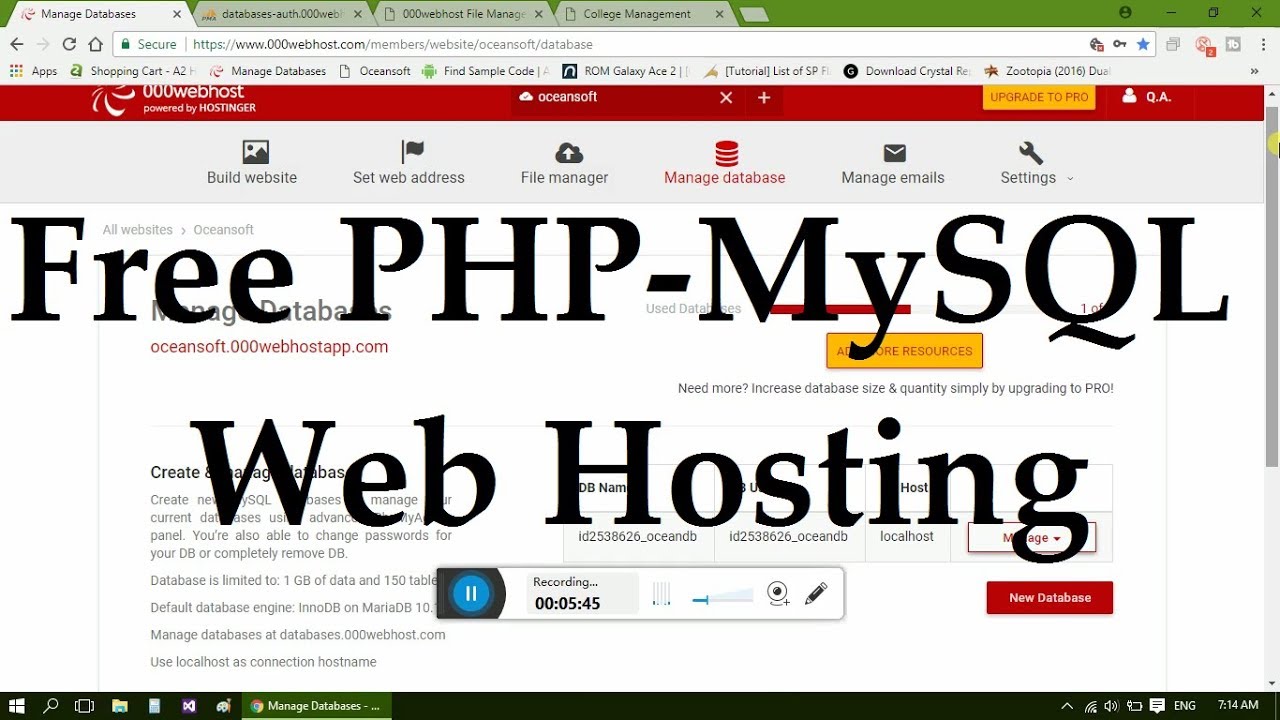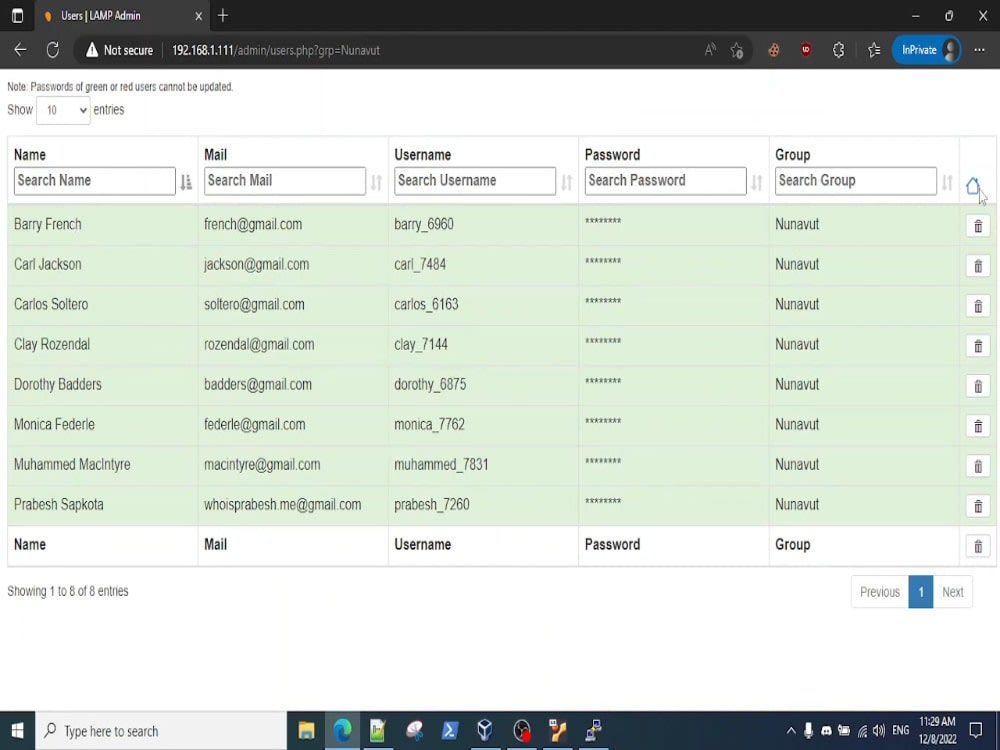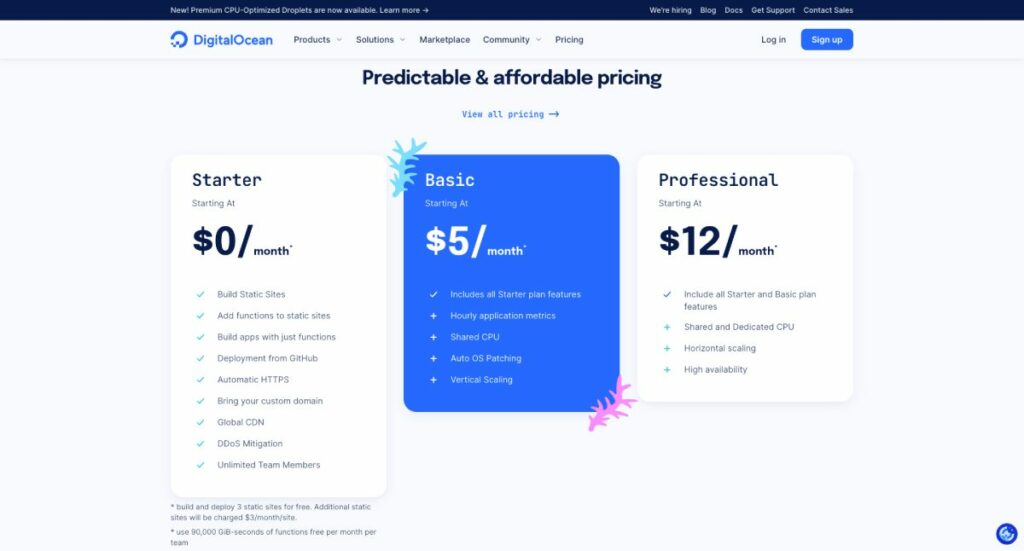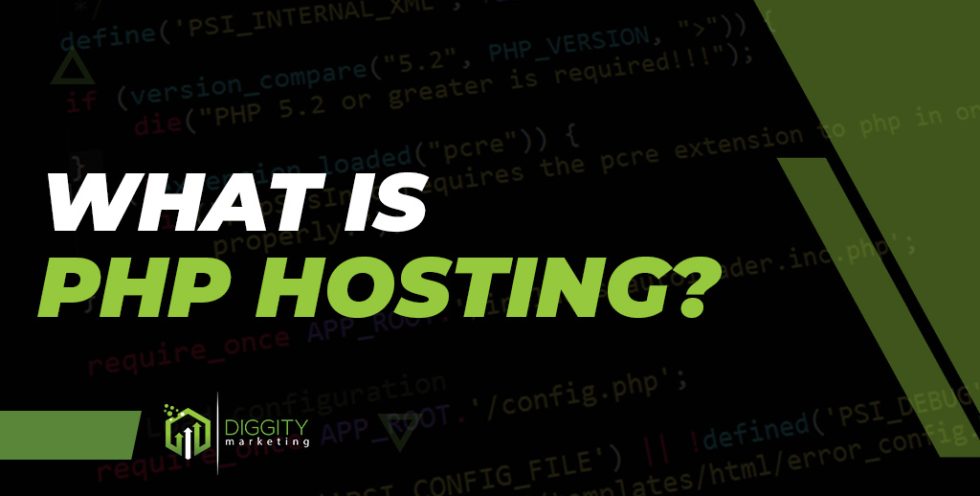Host PHP website free, a tempting proposition for many aspiring web developers, offers a cost-effective entry point into the world of web development. This guide delves into the intricacies of free PHP hosting, exploring its advantages, limitations, and the essential considerations for building and managing your own PHP website without breaking the bank.
We’ll navigate the landscape of popular free hosting providers, examining their features, target audiences, and the trade-offs involved. We’ll also equip you with the knowledge to choose the right provider for your needs, set up your website, and develop secure, performant, and scalable web applications.
Free Hosting Options

Finding a reliable free web hosting provider for your PHP website can be a challenge. While these providers offer a cost-effective solution, they often come with limitations in terms of features, performance, and resources. This section will explore some popular free hosting providers and discuss their strengths and weaknesses to help you make an informed decision.
Free Hosting Provider Comparison
Free hosting providers offer a platform for individuals and small businesses to establish a web presence without upfront costs. These providers typically offer limited resources, such as storage space, bandwidth, and database support.
- Free hosting providers: These providers often offer basic features and limited resources. They are ideal for simple websites with low traffic.
- Shared hosting: Shared hosting is a cost-effective option where multiple websites share the same server resources. This can result in performance issues if one website experiences high traffic.
- Cloud hosting: Cloud hosting offers flexibility and scalability, allowing you to adjust your resources as needed. However, cloud hosting can be more expensive than shared hosting.
Popular Free Hosting Providers for PHP Websites
Here is a list of popular free web hosting providers that support PHP:
- 000Webhost: 000Webhost is a popular free hosting provider that offers a variety of features, including a free domain name, 1GB of disk space, and 10GB of bandwidth. They also support PHP, MySQL, and other popular web technologies. 000Webhost is a good option for beginners and small websites with low traffic.
- Freehostia: Freehostia offers free web hosting plans with unlimited disk space and bandwidth. They also support PHP, MySQL, and other popular web technologies. However, Freehostia’s free plans come with limited features, such as no email accounts or website builder. Freehostia is a good option for websites that require a large amount of storage space and bandwidth.
- AwardSpace: AwardSpace offers free web hosting plans with 1GB of disk space, 10GB of bandwidth, and support for PHP, MySQL, and other popular web technologies. AwardSpace also offers a free domain name for a year. AwardSpace is a good option for beginners and small websites with low traffic.
- ByetHost: ByetHost is a free hosting provider that offers a variety of features, including unlimited disk space, unlimited bandwidth, and support for PHP, MySQL, and other popular web technologies. ByetHost also offers a free domain name for a year. ByetHost is a good option for websites that require a large amount of storage space and bandwidth.
- InfinityFree: InfinityFree offers free web hosting plans with unlimited disk space, unlimited bandwidth, and support for PHP, MySQL, and other popular web technologies. InfinityFree also offers a free domain name for a year. InfinityFree is a good option for websites that require a large amount of storage space and bandwidth.
Security Considerations: Host Php Website Free
While free hosting offers a cost-effective solution, it’s essential to acknowledge the inherent security risks associated with such platforms. Understanding these risks and implementing appropriate mitigation strategies is crucial for safeguarding your website and user data.
Understanding Security Risks, Host php website free
Free hosting providers often operate on shared servers, where multiple websites reside. This shared environment can introduce vulnerabilities, as a compromise on one website could potentially affect others. Additionally, free hosting providers may have limited security resources compared to paid counterparts, potentially leading to slower response times to security threats.
Implementing Security Measures
- Strong Passwords: Use complex passwords with a combination of uppercase and lowercase letters, numbers, and symbols. Avoid using easily guessable information like your name or birthdate. Consider using a password manager to securely store and manage your credentials.
- File Permissions: Properly configure file permissions to restrict access to sensitive files and directories. Ensure that only authorized users have read and write access to specific files. This helps prevent unauthorized modifications or data breaches.
- Regular Updates: Keep your website’s software, including the operating system, web server, and plugins, up to date. Software updates often include security patches that address vulnerabilities, making your website more resilient to attacks.
Safeguarding User Data
- Data Encryption: Encrypt sensitive user data, such as passwords and payment information, using secure protocols like HTTPS. This ensures that data is transmitted securely and cannot be intercepted by malicious actors.
- Data Backup: Regularly back up your website data to a secure location. This helps recover data in case of a security breach or accidental data loss. Consider using cloud storage services or offsite backups.
- Two-Factor Authentication: Implement two-factor authentication (2FA) for user accounts. This adds an extra layer of security by requiring users to provide a second authentication factor, such as a code sent to their phone or email, in addition to their password.
Preventing Common Vulnerabilities
- Cross-Site Scripting (XSS): XSS attacks involve injecting malicious scripts into a website to steal user data or manipulate website functionality. Implement input validation and output encoding to prevent XSS attacks.
- SQL Injection: SQL injection attacks target databases by injecting malicious SQL code into input fields. Use parameterized queries or prepared statements to prevent SQL injection attacks.
- Brute-Force Attacks: Brute-force attacks attempt to guess passwords by trying numerous combinations. Implement rate limiting to prevent excessive login attempts and use strong password policies to mitigate brute-force attacks.
Scaling Your Website
Free hosting is a great starting point for your website, but as your website grows in popularity and traffic, the limitations of free hosting become apparent. You might experience slower loading times, reduced features, or even website downtime. It’s important to consider the options available for transitioning to a paid hosting plan as your website scales.
Options for Migrating to Paid Hosting
When the limitations of free hosting become apparent, you have several options for migrating to paid hosting providers. These providers offer a range of plans with varying levels of resources, features, and pricing. Choosing the right plan depends on your website’s specific needs and your budget.
- Shared Hosting: This is a cost-effective option for smaller websites with low traffic. Multiple websites share the same server resources, which can lead to performance issues if one website experiences a surge in traffic.
- VPS Hosting: A Virtual Private Server (VPS) offers more resources and control than shared hosting. You have a dedicated portion of a server, providing better performance and security.
- Cloud Hosting: Cloud hosting utilizes a network of servers to distribute your website’s traffic and resources. This offers high scalability, reliability, and flexibility.
- Dedicated Hosting: This option provides you with an entire server dedicated solely to your website. This offers the highest level of performance, security, and control.
Factors to Consider When Transitioning to a Paid Hosting Plan
- Website Traffic: The amount of traffic your website receives is a key factor in determining the resources you need. Higher traffic requires more processing power, storage space, and bandwidth.
- Website Features: Consider the features your website requires, such as databases, email accounts, and security features. Different hosting plans offer varying levels of support for these features.
- Budget: Paid hosting plans vary in price depending on the resources and features offered. Set a realistic budget and choose a plan that provides the necessary resources without breaking the bank.
- Support: Look for a hosting provider that offers reliable customer support and technical assistance. This is crucial if you encounter any issues with your website.
Free Hosting Alternatives
While free hosting services can be a good starting point for your PHP website, they often come with limitations that can hinder growth and scalability. Fortunately, numerous alternatives exist, each offering a unique set of advantages and disadvantages.
Self-Hosting
Self-hosting provides complete control over your website’s environment, allowing you to customize configurations and install specific software. This approach is particularly suitable for developers seeking a high degree of flexibility and those who prefer to manage their infrastructure directly.
Pros
- Complete control: You have full control over your website’s environment, including software installations, configurations, and security measures.
- Cost-effectiveness: In the long run, self-hosting can be more cost-effective than paid hosting services, especially if you manage the infrastructure efficiently.
- Customization: You can tailor your server setup to meet your specific needs and preferences, optimizing performance and functionality.
Cons
- Technical expertise required: Self-hosting demands technical knowledge and experience in server administration, network management, and security.
- Initial investment: You need to invest in hardware, software, and potentially a dedicated internet connection for self-hosting.
- Maintenance responsibility: You are responsible for all aspects of server maintenance, including updates, security patches, and backups.
Cloud Hosting
Cloud hosting utilizes a network of remote servers to provide hosting services, eliminating the need for physical hardware. This approach offers scalability, flexibility, and cost-efficiency, making it a popular choice for websites with varying traffic demands.
Pros
- Scalability: Cloud hosting allows you to easily scale your resources up or down based on your website’s traffic and performance requirements.
- Reliability: Cloud providers offer high availability and redundancy, ensuring your website remains accessible even in the event of server failures.
- Cost-effectiveness: You pay only for the resources you use, making cloud hosting a cost-efficient option for websites with fluctuating traffic.
Cons
- Potential security concerns: You are reliant on the cloud provider’s security measures, which may not always be as robust as self-hosting.
- Limited control: You have less control over the underlying infrastructure compared to self-hosting, potentially limiting customization options.
- Vendor lock-in: Switching cloud providers can be challenging and may involve data migration complexities.
Content Delivery Network (CDN)
CDNs distribute website content across multiple servers located geographically, ensuring fast delivery to users worldwide. This approach significantly improves website performance and reduces latency, particularly for users located far from the origin server.
Pros
- Improved website performance: CDNs deliver content from servers closer to users, reducing loading times and enhancing user experience.
- Reduced server load: By caching content on edge servers, CDNs alleviate the load on your origin server, improving overall website performance.
- Enhanced security: CDNs provide security features like DDoS protection and SSL/TLS encryption, safeguarding your website from malicious attacks.
Cons
- Additional cost: CDNs are typically paid services, adding to your overall hosting expenses.
- Potential caching issues: Incorrect caching configurations can lead to stale content being served to users, impacting website accuracy.
- Complexity: Setting up and configuring a CDN can be complex, requiring technical expertise and understanding of CDN functionalities.
Community Resources
The PHP community is vast and supportive, offering a wealth of resources for developers of all skill levels. Engaging with these communities can provide invaluable support, facilitate learning, and foster networking opportunities.
Online Communities and Forums
These online platforms provide a space for PHP developers to connect, share knowledge, and seek assistance.
- Stack Overflow: A popular question-and-answer website for programmers, Stack Overflow features a dedicated section for PHP-related questions. Users can search for existing solutions, ask new questions, and contribute answers to help others.
- PHP.net: The official website for the PHP programming language, PHP.net hosts forums dedicated to various aspects of PHP development, including discussions on specific functions, libraries, and frameworks. It also provides access to the official PHP documentation and resources.
- Hosting Provider Forums: Many web hosting providers offer dedicated forums where users can discuss issues related to their hosting plans, PHP configurations, and other technical aspects. These forums can be valuable for troubleshooting specific problems or seeking advice from other users of the same hosting service.
Benefits of Engaging with the Community
Participating in online communities offers numerous advantages for PHP developers.
- Support and Troubleshooting: When encountering a technical challenge, online communities provide a platform to seek assistance from experienced developers. Members can share their knowledge and help troubleshoot problems, saving time and effort.
- Learning and Development: Online forums and communities offer a rich environment for learning new concepts and techniques. Developers can engage in discussions, explore different approaches, and stay updated on the latest trends in PHP development.
- Networking and Collaboration: Engaging with the PHP community fosters connections with other developers. Networking opportunities can lead to collaborations, job opportunities, and shared learning experiences.
Future Trends

The landscape of free PHP hosting is constantly evolving, driven by advancements in cloud computing and software development methodologies. Two notable trends that are shaping the future of free PHP hosting are the rise of serverless computing and the growing popularity of containerization.
Serverless Computing
Serverless computing offers a paradigm shift in how web applications are deployed and managed. Instead of provisioning and maintaining servers, developers can focus solely on writing code, with the underlying infrastructure handled by cloud providers. This approach eliminates the complexities of server management, allowing developers to scale their applications effortlessly and pay only for the resources they consume.
The rise of serverless computing presents several advantages for free PHP hosting:
- Reduced Costs: Serverless platforms charge based on actual resource usage, making them cost-effective for applications with fluctuating traffic patterns. Free hosting providers can leverage serverless infrastructure to offer more generous resource allocations to their users, without incurring significant overhead costs.
- Simplified Deployment: Serverless platforms abstract away the complexities of server management, enabling developers to deploy their PHP applications with minimal effort. This ease of deployment can attract more developers to free hosting platforms, fostering a vibrant community.
- Scalability: Serverless platforms automatically scale resources based on demand, ensuring that applications can handle traffic spikes without performance degradation. This inherent scalability is crucial for free hosting providers who need to accommodate a wide range of users with varying traffic levels.
However, serverless computing also presents some challenges:
- Cold Starts: When a serverless function is invoked after a period of inactivity, it requires time to initialize, leading to a delay in response. Free hosting providers need to optimize their serverless configurations to minimize cold start times and ensure a seamless user experience.
- Vendor Lock-in: Serverless platforms are typically tied to specific cloud providers, potentially limiting the flexibility of free hosting providers. Choosing a platform that offers portability across different cloud providers can mitigate this risk.
- Debugging Challenges: Debugging serverless applications can be more complex compared to traditional server-based deployments. Free hosting providers need to provide comprehensive debugging tools and support to assist developers in troubleshooting issues.
Containerization
Containerization, through technologies like Docker, has revolutionized software development by providing a consistent and portable environment for applications. Containers package an application and its dependencies into a self-contained unit, ensuring that it runs identically across different environments, regardless of the underlying operating system.
Containerization offers several benefits for free PHP hosting:
- Improved Consistency: Containers eliminate environment-related issues, ensuring that PHP applications behave predictably across different platforms. This consistency simplifies development and deployment, reducing the likelihood of unexpected errors.
- Faster Deployment: Containers can be deployed quickly and efficiently, as they do not require complex installation processes. Free hosting providers can leverage containerization to streamline application deployment, improving the overall user experience.
- Resource Optimization: Containers allow for efficient resource allocation, as they share the underlying operating system kernel. Free hosting providers can utilize containerization to maximize resource utilization, offering more generous resource allocations to their users.
However, containerization also presents some challenges:
- Security Considerations: Containers require careful security configurations to prevent vulnerabilities and malicious attacks. Free hosting providers need to implement robust security measures to protect their users’ applications and data.
- Resource Overhead: Containerization introduces some overhead, as containers require additional resources for management and orchestration. Free hosting providers need to optimize container configurations to minimize resource consumption and ensure efficient performance.
- Learning Curve: Containerization can be a complex technology for developers who are unfamiliar with its concepts and tools. Free hosting providers need to provide comprehensive documentation and support to help developers adopt containerization effectively.
Final Review
While free PHP hosting offers a valuable starting point, understanding its limitations and exploring alternative solutions is crucial for long-term growth. As your website evolves, consider the benefits of paid hosting, self-hosting, or cloud-based platforms to unlock greater scalability, performance, and security.




